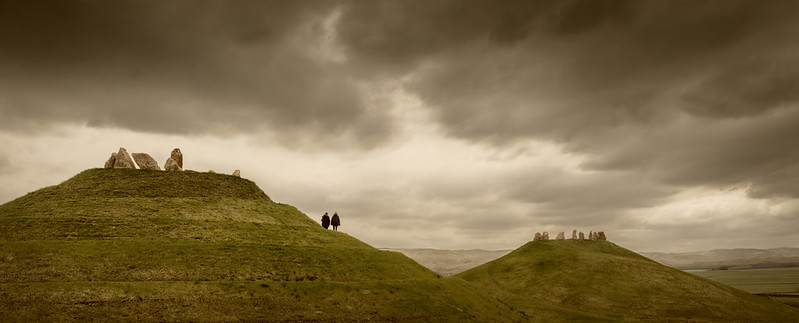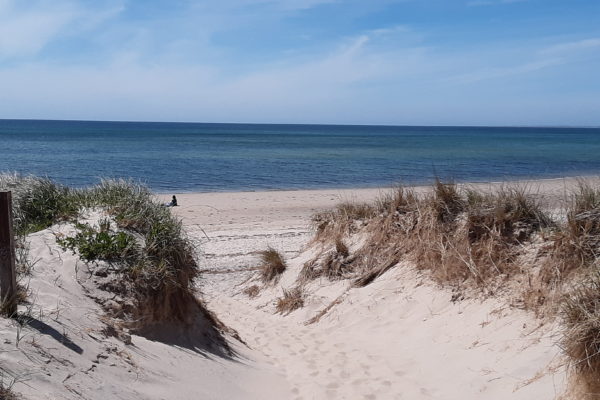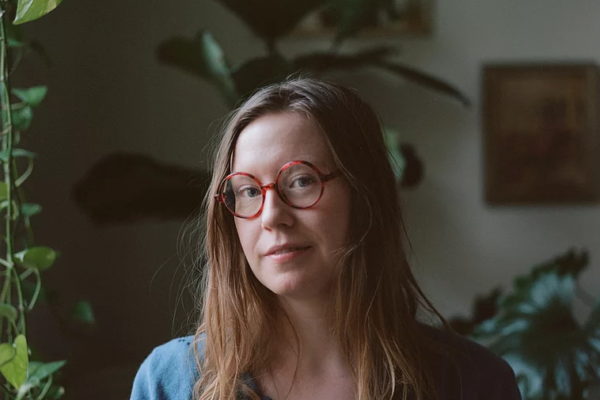In this interview, the poet Mary Ann Samyn talks about her first encounters with Emily Dickinson’s work, her best advice for writing students, and her new collection, Air, Light, Dust, Shadow, Distance, out now from 42 Miles Press.
I read somewhere in a “How to Interview” guide to try and “get beneath the bonnet of the writing.” I know we share an interest in dolls, so I figured this would be a good start: Did you have a favorite childhood doll?
The “bonnet”–!?! I love that. Love a bonnet. Reminds me of Laura Ingalls Wilder. Also, cars, back in the day, right? The hood is the bonnet? I think.
Anyway: yes: dolls! I had three main types: baby dolls (Pussy Willow and Anna) and their older “big girl” cousins (Mandy was my favorite: she had the nicest hair!) and their soft-body friends like Raggedy Ann, who still has a place of honor in my bedroom, and Holly Hobbie; Barbie dolls, though mostly Skipper, with whom I identify not unhappily; and, best of all, “wooden dolls,” the name my sisters and I gave to the Fisher-Price Little People who were, originally, made of wood and who were actually small (not all puffed up as they are now).
My childhood was mostly a rotation among these various dolls and then just “pretend”—which basically meant being outdoors and make up stories and riding my bike and playing with the dog and walking around aimlessly and without camps or instruction or all that stuff that kids have to endure now.
As for a favorite… all of them. Or me, who I was, with them. That’s my favorite.
Was there a moment in childhood that first sent you to poetry?
My key poetry memory is of my eldest sister, Ellen, reading Dickinson to me as I lay on her bed. We also listened to James Taylor and The Beach Boys and all the great sappy and groovy music of the 70s and all of it—Dickinson and Sweet Baby James and “Silly Love Songs” and etc.—is with me still. Foundational stuff, for sure.
In the past, you’ve cited artists, from Karen Carpenter to Eva Hesse, as inspirations or jumpstarts to your material. Are you particularly inspired by any artists outside of poetry today?
Not really. I just like to take walks and notice what there is to notice. Nature is my muse, or whatever. Except please know that the “or whatever” is key and not the muse. That stuff is too much for me. And Hesse, others—I still like them, but mostly they helped me write without need of them. Excellent mentors, in that sense.
Did any spaces or habits become ritual for you in writing Air, Light, Dust, Shadow, Distance?
I have daily routines that help me out. First breakfast and second breakfast. Lots of walks with my dog. A raised eyebrow. The wise counsel of my cat. A return to Nancy Drew when in a pinch. Et cetera. These habits didn’t originate with this book, but probably they were part of its making.
Was there a surprising or unexpected moment in the writing of these poems?
Let’s see… I hope so. In every poem, preferably. I can’t recall anything particular, but the unexpected is part of it, always. I’m always trying to make another push.
What is your revision process like?
I listen at the poem. Like you’d listen at a door. Or a seashell. I usually finish a poem not in one sitting, exactly, but during one period of time in my life. It’s difficult to return much later. I’m not the same listener.
Is there a period of pause after finishing a collection, or do you continue chugging along?
A pause, for sure. That’s how I know it’s done. A quiet comes down and feels more final (as opposed to the lulls that are always part of writing—the seemingly “not writing” that is of course so crucial). Ok, so that’s done. That’s how it feels.
If not yourself, who or what would you be?
Maybe a heroine in a Victorian novel? Someone who walks out and back. Plays the piano better than I do. Can sew way better. The rustling of my dress… I think I’d like that. And waiting, by windows, or seashores. I think I could do it; I do it already.
Having been a student of yours at West Virginia University, I know how generous you are as a teacher. You often advise: “Take good care.” Is it challenging to balance your devotion to the success of your students and your own life/work as a poet?
Sometimes, yes. But I take “take good care” seriously and do secure my own mask, as it were, before helping others. That’s just sane. Sanity must come first. Sanity and beauty, which are, finally, the same for me.
Do you engage in other art forms? If so, could you describe something you’ve created?
I love to cook. Does that count? I think so. Same as with poetry: I lose track of time. Baking especially requires attention. Changes are possible… but not without regard for measurement, etc. As you can imagine, since you’ve been my student and know how much I care for the line, measurement really appeals to me. From scratch appeals to me. So, bread, pie crust, brownies (I make the best brownies!), tarts, pizza, (very excellent) cake. But I also like cooking, not just baking, and cooking appeals to me because, like teaching, it’s more improvisational. People often ask what I like to cook. My answer: real food. I don’t care for exotic recipes with a lot of obscure ingredients. I like to eat! And within the hour, if possible. I also enjoy the care of making simple things. Just this afternoon I was cutting some fruit: watermelon, strawberries, a nectarine. Such pretty colors and interesting textures! I enjoyed the simple process of cutting the fruit, putting it in an attractive bowl, etc. Anyone can do this; I hope they do; it’s very pleasing. Life is just such moments, it seems to me. I try to be there for them.
I also really enjoy gardening. English roses are my favorites. I have some in West Virginia and many more in Michigan. They have the best names. Jude the Obscure, The Shepherdess, The Lady of Shalott, etc.! I love their cupped shape. There’s warmth in that shape. Something richer, truer, more generous, to my mind, than a perfectly pointed long stem rose. I prefer the apricot-colored ones. They change colors a lot, morning to evening and day to day. I suppose they’re the artists who are “jumpstarting” my writing (and other things) these days. They’re quite aspirational.
In an age of oversharing—via Instagram, reality tv, etc.—your work has often been lauded for its interest in elegance and restraint, while remaining resonant and “deep-feeding.” Is this something you manage consciously?
Oh dear, yes: I don’t like it. I began Instagramming, as they say, as a way to share pics, mostly of things I had cooked or baked, with my sisters and sister-in-law and nieces. That was it for a few years. Then, somehow, students began following me and that has changed things a bit, to be honest. Audience awareness and all. Fortunately, I like honesty and decorum in equal measure, so it’s been ok, but private life is, well, private. Isn’t it? I think so. Even when I write about my life, as I do, the poems aren’t anecdotal. They’re not my diary. In order to write them, I need to be close to myself… and, also, to step back. The “so what” lies in this closeness and this distance.
Do you have a literary crush?
Hah! Well… Charles Wright, always. Mr. (W)Right, as my friend Lisa Spaar and I call him. He was (and is and always will be) my teacher. I cherish his mentorship, his kindness. He has that old-fashioned elegance that is so rare. My father had it too. Nothing can compare.
Also, I suppose Richard Ford. I admire his fiction a great deal. Rock Springs long ago; Canada just last summer. That novel, Canada, blew me away. Ruined me for fiction for a while. I saw Ford once and was quite flustered. If I could write prose as he does—way slowed down, to the point that you can feel the weather—well, I would.
Has the landscape of poetry changed since the beginning of your career?
Um, maybe? I don’t even know! I suppose I could have a better “career” if I did. But po biz has never appealed to me. It seems to have so little to do with writing poems. Writing poems, I like. It’s hard, and nourishing. Po biz is pretty silly, and exhausting. So the landscape of poetry… I don’t know… landscapes change with the seasons, no?
Would you like to see any aspects change course or direction in today’s poetry?
I try not to wish for things to be other than they are! In any part of life. A challenge, to be sure. Charles once said that how he writes isn’t fashionable, but will be, again, some day. I feel similarly. The seemingly small lyric… I like it, still.
What is your favorite virtue?
My father often said: “keep the faith.” One of the first poems I knew and truly understood is Dickinson’s “’Hope’ is the thing with feathers–…” Equanimity is of daily value, I find. So those three: faith, hope, equanimity. They’re related, aren’t they?
“Words feel very physical to me,” you once said. Are you carrying a favorite title or line today?
Well, yes, sure, but I don’t share those! Until they become poems, that is. Until then, I just carry them.
If you believe in heroes, do you have any?
My father. Always.
How did you come to name this collection?
The title is from Denise Levertov’s essay “Some Notes on Organic Form.” I was re-reading the essay for a grad class a few years ago and was struck by this sentence: “Air, light, dust, shadow, and distance have to be taken into account.” Basically, she’s talking about paying attention.
You are known for being a devoted mentor to countless students who pass through the Creative Writing Program at West Virginia University. Do you have any advice for yourself?
I’ve said this before, in other interviews, but some of the best advice I’ve received, many years ago from my friend Rebecca Emlinger Roberts, herself a wonderful writer, was “bring yourself along.” I continue to remind myself to do that. I might use different words, but the meaning is the same. To “bring oneself along” is to keep oneself company, to nurture oneself, to pay attention, to be kind. Much good proceeds from here.
Would you consider this new collection more a departure or an arrival?
Both. About two thirds of the way through the writing of the poems that would become this book, my father had a massive stroke. That in and of itself was a departure, and an arrival. My father wasn’t the same; my family wasn’t; I wasn’t. My poems couldn’t be either.
If a single poem from Air, Light, Dust, Shadow, Distance were to be written briefly in smoke by, say, one of those airplanes at the beach, which one might that be?
Oh, I like that idea. That should happen. Maybe the one that ends “Christ is his hand.” The ephemeral nature of smoke would seem the perfect medium.




